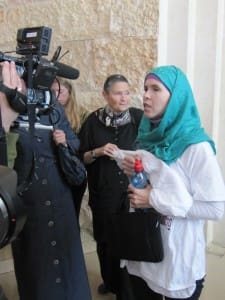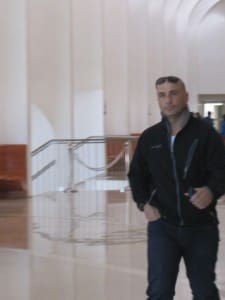Enjoy 7-minutes of laughter, and please comment if you like this video as much as we do!
Enjoy 7-minutes of laughter, and please comment if you like this video as much as we do!
This poem was published on PeaceXPeace. I would love your comments.
On Fridays,
I feel rested
you feel anxious
I make pancakes
you cut onions
I fold laundry
You tie kafiyehs
I read email
You read danger
I buy fish
You buy time
I contemplate you
you contemplate them
Then,
tear gas stings
shots ring
I cringe
you bleed
I write
My headline for the article I wrote that appeared in The Guardian was “Jilani Family Cautiously Hopeful as Israel Impunity Stands Trial.” Having spoken recently to Ziad Jilani’s widow, I confirm this is true: something feels different about this case, which is currently under consideration by the Israeli Supreme Court.
Please read the article and voice your comments on this blog. Will Israel again protect their police despite violations of human rights? Or will they, in this case, admit that wrong is wrong and hold those responsible to account?


This article first appeared on PeaceXPeace.
Palestinians know what “Ramallah Bubble” refers to, even if they’ve not heard the term. The city of Ramallah is palpably different from the rest of Palestine. It’s the lifestyle, the mindset, the money, and, above all else, the irking feeling that it might suddenly burst.
Inside Ramallah, Israeli incursions are relatively infrequent and movement is unencumbered. Palestinian police stand on nearly every corner in the bustling downtown shopping district; and construction is booming. To outsiders, Ramallah’s appearance of “normalcy” may seem proof that the “peace process” is benefiting Palestinians. But some locals, including some mothers, believe that Ramallah’s fake “good life” dilutes children’s national consciousness.
“It’s really difficult to teach our children what military occupation means while living in Ramallah. Unless an Israeli jeep drives by, we can’t convince them there’s a problem. There are too many distractions,” Iman Assaf said.
Iman sipped espresso at Zamn Café, itself a product of Ramallah’s aid-fueled economic growth, as she chatted with friends about the challenges of mothering in Ramallah today.
Joyce lamented, “Once we invited friends for dinner. We found their four kids and our four kids sitting together in the playroom staring at their iPads – eight iPads in one room!”
Ramallah has been host to a pseudo-government since the Palestinian Authority was established as a result of the Oslo Accords. The five-year interim period, which has now dragged into nearly twenty years, was meant to build trust and resolve final status issues. But hope seems to have dissolved into Walls, fences, ditches and checkpoints and relentless violence. This defines life in most of the occupied Palestinian territory—except in Ramallah.
In fact, Movenpick, a visible symbol of the Ramallah Bubble, runs a five-star hotel in Ramallah. General Director, Michael Goetz, said they became profitable in their second year, even sooner than their financial forecasts predicted. Movenpick’s success, and that of the hotels, restaurants, landlords, and other service providers, is primarily a result of international aid. Palestine receives billions of dollars in international aid, most of it flowing through Ramallah before trickling to more remote areas.
“I was in Gaza recently,” May Kishawy shared. “People in Gaza don’t live like we do. They know what poverty is. They understand from their experience that our political problems are not solved.”
People who enter any one of Ramallah’s refugee camps know that that poverty is real in Palestine, even in Ramallah, and a stroll near the checkpoint, especially on a Friday, will surely find angry boys throwing rocks at the symbols of occupation and being tear-gassed in response. The point is that while Ramallah isn’t free, people in Ramallah may choose not to see. For mothers, the choice is poignant: “Should I protect my children from the horrors of occupation if I can? Or should I show them the truth even if it hurts?”
“When I was growing up in Nablus during the first Intifada,” Iman said, “we couldn’t avoid the occupation and we didn’t want to. We were young, but we cared about social issues like violence against women and attacks on villages. Today, kids are more concerned about the model of mobile phone they carry. We’re still occupied and we have no rights, but the new generation doesn’t understand that.”
The mothers acknowledged that consumerism is global, that peer pressure is universal, and that mother-child conflicts over television time are unexceptional. Still, there is something strange and disturbing about entering Jasmine Café in the late afternoon and finding it crammed with local school children—while their peers in villages and refugee camps are being tear gassed or assaulted, arrested, and sometimes killed.
Naela Rabah, Principal of the Greek Catholic School of Our Lady Annunciation, said that while not all Ramallah families have money, all are subjected to the influence of the Ramallah Bubble. “Many famililes in Ramallah are living beyond their means. They take loans to buy houses and cars. The kids who have access to money put pressure on other kids to wear fancy clothes, too. Parents give in because they don’t want their children to feel self-conscious, but they’re taking a risk. None of us has security. If I lose my job, I have no income. I don’t have health care like they do in other places or old-age pension.”
Some critics assign blame for Palestine’s illusory economy on international donors, who inject money without challenging the fundamental problem of Israeli occupation. Other critics point specifically to World Bank policies that tout private sector-led economic growth as a solution for Palestine’s problems—without admitting that real development under occupation is impossible.
The group of Ramallah mothers stopped short of saying that international actors created the Ramallah Bubble to intentionally lead Palestinians away from their national aspirations, but they did say that systemic forces are pushing Palestinian society in that direction.
An eighth-grade student at a private school in Ramallah agreed that the top layer of Palestinian society does have money to burn, but she disagreed that Ramallah youth have lost touch with their national consciousness.
“Kids in Ramallah are more aware of the occupation than kids in Jerusalem,” she said. “Don’t forget that kids in Ramallah experience the occupation every time they are prevented by soldiers from crossing the checkpoint in order to get to the mall.”
This article first appeared on PeaceXPeace.